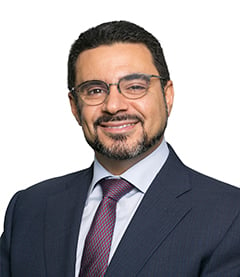-
Statutory Audit
We conduct an integrated audit, which combines the financial statement audit,independent and objective assurance on financial information, transactionsand processes.
-
Limited Review
We offer services relating to reviews of historical financial informationby expressing negative assurance on such historical financial information.
-
Agreed Upon Procedures
We engage with organisationsto perform specific procedures and report findings to conform to their needs.
-
Financial Reporting Advisory Services (FRAS)
Our team provides timely advice on the impact of accounting changes to assist businesses in the development of an appropriate implementation roadmap.
-
Business Consulting
Grant Thornton UAE provides organisations with implementable plans that drive sustainable growth strategies to grow and optimise their business performance.
-
Business Risk Services
Organisations need to understand risks thoroughly to be able to manage them better. Grant Thornton UAE helps businesses achieve the best balance between minimising risk exposure, optimising profitability and developing compliance review checklists.
-
Regulatory Advisory Services
Grant Thornton UAE's extensive understanding of the overarching supervisory framework within the region equips our professionals to support financial institutions comply and abide by the set of regulatory mandates throughout the rapidly evolving ecosystem.
-
Financial Advisory
Grant Thornton UAE works with organisations on transactions from start to finish, assisting with strategy, identifying risks, executing deals, and helping to unlock their potential for growth and value creation.
-
Restructuring Advisory
Grant Thornton UAE is committed to realising value for shareholders, in a way that recognises and supports the interests of all stakeholders. Our solutions maximise value, provide clarity and direction, and accelerate recovery and transformation for businesses.
-
Technology Advisory & Cybersecurity
IT and technology are fundamental to drive the performance of businesses. Through leveraging the power of technology, Grant Thornton UAE helps organisations define and identify growth opportunities to achieve value-driven transformation and innovation.
-
Forensics
Fraud and corruption pose a growing challenge worldwide. As the commercial landscape changes, an increasingly regulated environment requires stringent governance and compliance processes. Grant Thornton UAE helps organisations navigate challenges and crisis with a hands-on approach coupled with the use of technology.
-
ESG Services
The Environment, Social and Governance (ESG) agenda has gained significant traction over the years, to become one of the key strategic aspects of any business. It is imperative that all organisations, irrespective of industry sector, engage with their stakeholders and prioritise ESG practices to unlock sustainable growth opportunities.
-
Business Process Solutions
Our team at Grant Thornton offers comprehensive and cost effective outsourced solutions, enabling stakeholders and business owners to focus on their core business goals.
-
Corporate Tax
Our diversified team of corporate tax subject matter experts combines a perfect blend of international experience across several industry sectors, technical expertise, and commercial nuances with a commitment to deliver exceptional value to your business.
-
VAT
The VAT team at Grant Thornton is well versed with the VAT Laws applicable across the region and holds valuable experience and professional accreditation in assisting clients across diverse industries to comply with the VAT obligations.
-
Transfer Pricing
Grant Thornton UAE assists its clients in providing transfer pricing solutions that are implementable and operational, considering the facts and concerns of its clients.
-
International Tax and Tax Due Diligence
Grant Thornton UAE supports multinational groups to optimise their tax structures. We can also assist businesses in analysing existing group transactions and inter-group supplies, as well as advising on potential implications of various taxes to facilitate an efficient Group tax structure.
-
Economic Substance Requirements
Economic Substance rules were introduced in the UAE in 2019, requiring UAE businesses that undertake certain ‘Relevant Activities’ to maintain and demonstrate adequate substance.
-
Customs and International Trade
The team at Grant Thornton is positioned centrally to assist the businesses with global cross-border tax structuring, planning and compliance needs.
-
Excise Tax
We provide Excise Tax related advisory and compliance services to the producer, importer, and the storekeeper of excisable goods
Hisham Farouk:
Fortunately, our understanding of how to address the challenges of COVID-19 is improving every day. Our medical and scientific communities are learning and adopting new strategies to deal with the current global crisis, as are the world's policymakers.
To help the economies during this climate of uncertainty, global economic stimulus initiatives and reductions in interest rates are taking place, such as the Bank of England, or the US Federal Reserve whose efforts brought down the American cost of borrowing to its ever-lowest level in 50 years. However, and given the unknowns feeding into the panic, I think that now is the time for the MENA-based family businesses to take the necessary precautionary measures: It's time to act swiftly and prepare for the worst-case scenario. I'm not suggesting for businesses to show an immediate reaction by acting on contingency plans, but they should have them ready and be prepared.
Family business leaders can start by updating their continuity procedures to reflect the reality of office shutdowns and remote working practices, as well as to investigate how these measures might impact various costs and timelines. I believe that budgets should be reassessed and redeveloped with a worst-case scenario in mind. We've already seen the first wave of impacted industries, including aviation, logistics and hospitality, that were momentarily crippled by the COVID-19 pandemic. Businesses in other sectors should take note and prepare, but not panic. I believe that cash flow and working capital are critical right now, but regardless of the balance sheet, sustainability may hinge on having a budget that works no matter what. Once again, I'm not suggesting businesses to hit the big red button and immediately change direction, however, they need to be mentally, emotionally, and fiscally prepared for whatever comes next.
To begin with, I see a few options to help family businesses mitigate revenue loss and supply chain disruption as of now:
- Invest in infrastructure to enable remote working. We are seeing the importance of agility firsthand. Businesses must keep working to maintain productivity, and many still are. Google's entire North American workforce, more than 100,000 employees, are currently working from home. Nevertheless, remote work settings have been becoming more prevalent every year. A framework that facilitates working remotely, with obvious considerations given to server access and security, will stay relevant long into the future.
- Consider market demand while evaluating supply chain. Take a look at how a slowdown in the number of orders can lead to transparent discussions with customers. I think one of the most interesting things about this outbreak is that it's truly a global phenomenon. Whether suppliers are located in China or Germany or even in the Middle East, what's happening is impacting everyone. There are many examples to learn from, and just as many creative options for businesses when it comes to developing contingencies.
- Dive deep and be honest. Businesses can be reluctant to audit their internal structures and cost models. Now is the perfect time to ask the difficult questions and be prepared to act on the answers. If the worst-case-scenario becomes a reality, due diligence could be the only deciding factor between success and failure. If it doesn't happen, businesses will still gain actionable insights and potentially end up saving money down the road.
- Test your resilience. Businesses should test their model against various scenarios and see what the potential outcome could have been. Not only can discoveries from this exercise inform decisions when it's business-as-usual again, but they'll also safeguard the business for the next big challenge.
Regardless, whichever direction the business takes must be examined through the lens of social responsibility. People are still the priority. Businesses are created for people, and not the other way around. Of course, it's easy to say and harder to do, but we should not forget the remarkable times when companies stood by their teams through a crisis and came out of the other side with an unmatched competitive advantage. Organizations that support their staff and are willing to invest in their wellbeing do more to ensure their future than anything else.


